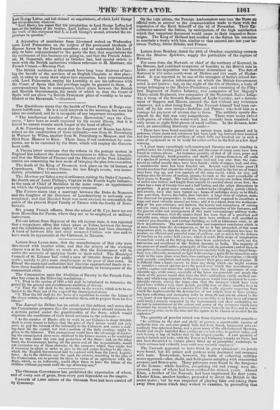Letters from Lyons state, that the manufacturers of that city
were threatened with another crisis, and that the misery of the working classes was at its height ; so much so, that the Government will be under the necessity of applying funds to their relief. The Municipal Council of St. Etienne had voted a sum of 300,000 francs for public works, merely to give sonic employment to the poor of that town. In Elbeuf the municipal authorities had likewise appropriated funds to re- lieve three hundred workmen left without labour, in consequence of the commercial crisis.
The Commission upon the Abolition of Slavery in the French Colo- nies has conic to the following resolutions-
" 1. That in the session of 1841 a bill shall be introduced to determine the period for the general and simultaneous abolition of slavery. " 2. That the bill shall lix the indemnity to the owners, which is to be re- funded to the State out of the wages of the emancipated slaves. "3. That the bill shall fix the -bases of a regulation to render the labour of the slaves certain, to enlighten and moralize them, and to prepare them for free labour."
The Journal des Dgbats has an article on this subject, and states that the Commission proposes that the emancipated slaves should remain for a certain period under the guardianship of the State, which would stipulate the conditions of their hired servants to the colonists- " As the number of Blacks able to work in our Colonies is about 166,000, there is every reason to believe that the price of their labour would not only serve to pay the interest of the indemnity to the Colonists and create a sink- lug-fund for the capital, but that a portion of the daily earnings might be given to the labourer. This arrangement would have the advantage of render- ing the emancipated slave more obedient to his former master, as he would feel that he was under the care and protection of the State : and, on the other hand, the Government, having all the power amid all the responsibility, would not encounter any of those obstacles to the measures which they might feel it necessary to adopt in order to give in the end entire freedom to the slave, which the English Government had to contend with from the Local Legisla- tures. As to the children and the aged, the owners, according to the Ain of the Commission, are to provide for them in virtue of an agreement with the State, Which, as an indemnity, would allow them to have the labour of the children without payment until the age of twenty-one:"


























 Previous page
Previous page